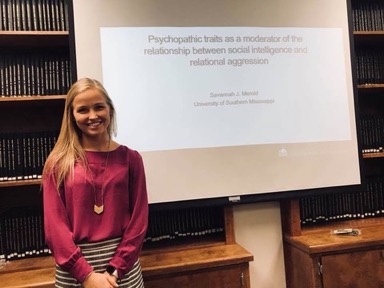
Director: Eric R. Dahlen, Ph.D.
psychopathy
Summer Steely Proposes Thesis
08/05/23 Aggression | Personality
Summer Steely, a doctoral student working in the lab, successfully proposed her master’s thesis yesterday. Summer’s thesis will focus on determining whether moral foundations theory (Haidt & Joseph, 2007) has utility in understanding social aggression in the context of psychopathic personality traits and moral disengagement. Moral foundations theory is a new area of study in the lab, and we are looking forward to learning more about how it may be relevant to many of the areas we have been studying.
Congratulations to Summer on her successful thesis proposal!
Congratulations to Summer on her successful thesis proposal!
Ali and Savannah Present Posters at Virtual MPA Convention
10/13/20 Anger | Aggression

Congratulations to Savannah and Ali for disseminating their findings!
Merold, S., Dahlen, E. R., Madson, M. B., & Nicholson, B. C. (2020, September 24-October 9). Psychopathic traits as a moderator of the relationship between social intelligence and relational aggression [Poster session]. 71st Annual Convention of the Mississippi Psychological Association, Bay St. Louis, MS, United States.
Poor, A., Dahlen, E. R., Leuty, M. E., & Nicholson, B. C. (2020, September 24-October 9). Relational aggression and trait anger: The mediating role of anger rumination [Poster session]. 71st Annual Convention of the Mississippi Psychological Association, Bay St. Louis, MS, United States.
Savannah Merold Defends Thesis
10/21/18 Aggression | Personality

Social intelligence and psychopathic traits were related to the perpetration of relational aggression, with social intelligence having a negative relationship and psychopathic traits having a positive relationship. Psychopathic traits moderated the relationship between social intelligence and relational aggression so that it became stronger as psychopathic traits increased. Some of Savannah’s findings differed from what was predicted, but since she included some additional variables beyond what we used for her thesis, we hope to run some additional analyses to learn more about the possible role of social intelligence and psychopathic traits in relational aggression.
Congratulations to Savannah on the successful thesis defense!
Savannah Merold Proposes Thesis
10/05/17 Aggression | Personality

There is reason to believe that social and emotional intelligence are positive predictors of relational aggression, and some have suggested that certain levels of these forms of intelligence might be necessary for relational aggression to occur (or at least to be successful). At the same time, there is no reason to think that social or emotional intelligence would be sufficient to produce relational aggression. Thus, we plan to examine the degree to which psychopathic traits might inform our understanding of this relationship.
Congratulations to Savannah on a successful thesis proposal!
What is the Dark Triad?
11/12/17 Personality
We are simultaneously drawn to and repelled by sensationalized stories of serial killers and mass murderers, seeking to understand how one of our fellow humans could commit such atrocities against innocent victims. Are these offenders vastly different from us in their genes, early environment, and/or recent life stressors, or are we all capable of such cruelty under the right set of circumstances? We wonder about what dark aspects of the human personality might be involved in such horrific acts. The question of why people violate social norms, commit moral transgressions (e.g., deceit, manipulation), and inflict harm on others has long intrigued psychologists and the public alike.
The Dark Triad refers to three overlapping but distinct personality traits associated with a variety of antisocial and morally transgressive behaviors: psychopathy, narcissism, and Machiavelianism (Paulhus & Williams, 2002). Considered together, these traits involve emotional coldness, a lack of empathy, the desire for personal advancement at the expense of healthy relationships, grandiosity, and a willingness to manipulate others (Jonason, Lyons, Bethell, & Ross, 2013). Although there are well-known clinical manifestations of psychopathy and narcissism, work on the Dark Triad has emphasized the goal of understanding the subclinical forms of these traits found throughout the population (Furnham, Richards, & Paulhus, 2013). That is, most of the Dark Triad research seeks to understand the dark personalities we encounter in our daily lives.
Psychopathy
Psychopathy describes a specific constellation of affective, interpersonal, lifestyle, and behavioral characteristics. These include impulsivity; callous affect; poor reliability in performing various roles; a lack of remorse, empathy, or guilt; and a tendency toward rule violation (Hare, 2003; Jones & Paulhus, 2014). Although psychopathy is associated with criminality and violence (Hare & Neumann, 2009) and is considered to be the most dangerous of the Dark Triad traits, its utility is not restricted to criminal and forensic contexts. For example, subclinical psychopathy predicts a variety of behaviors that are not necessarily criminal (e.g., academic dishonesty, relational aggression, cyber aggression, substance misuse) but still likely to be of interest (Kokkinos, Antoniadou, & Markos, 2014; Williams, Paulhus, & Hare, 2007).
Narcissism
Much like the clinical version (i.e., Narcissistic Personality Disorder), subclinical narcissism involves grandiosity, as well as entitlement and a sense of superiority; however, this grandiose narcissism is only one part of the construct. Another important aspect involves narcissistic vulnerability, which refers to a vulnerable self-concept and efforts at self-enhancement (Morf & Rodenwalt, 2001). While grandiose narcissism tends to be emphasized in much of the Dark Triad literature, vulnerable narcissism appears to be relevant in many areas of emotional and interpersonal functioning. Subclinical narcissism has been linked to aggression (Bushman & Baumeister, 1998), online antisocial behavior (Carpenter, 2012), and a number of other variables of interest.
Machiavellianism
Machiavellianism is probably the least understood of the Dark Triad traits. It refers to a manipulative interpersonal style named for Niccolò Machiavelli (Christie & Geis, 1970). In The Prince (1513), Machiavelli described several behaviors most of us would regard as immoral (e.g., lying, deceit, and even murder) as effective strategies for a ruler to maintain power. Machiavellianism is perhaps best characterized as the perspective that the ends justify the means. People high in Machiavellian traits are described as cynical on morality, focused on personal gain, and willing to manipulate and exploit others to achieve their goals (Jones & Paulhus, 2009). Machiavellian personality traits have been linked to online relational aggression (Abell & Brewer, 2014) and a number of other antisocial behaviors.
At the Anger and Traffic Psychology Lab, our primary interest with regard to the Dark Triad traits involves their role in nonclinical populations (i.e., individuals in the community who are not currently receiving treatment for diagnosed personality disorders or other mental health problems) of emerging adults. That is, we are interested in how individual differences in scores on subclinical measures of Dark Triad traits relate to a variety of socially undesirable behaviors (e.g., overt and relational aggression, cyber aggression, dysfunctional anger expression, jealousy, academic dishonesty, aggressive driving) among young adults.
References
Abell, L., & Brewer, G. (2014). Machiavellianism, self-monitoring, self-promotion and relational aggression on Facebook. Computers in Human Behavior, 36, 258-262.
Bushman, B. J. & Baumeister, R. F. (1998). Threatened egotism, narcissism, self-esteem, and direct and displaced aggression: Does self-love or self-hate lead to violence? Journal of Personality and Social Psychology, 75, 219-229.
Carpenter, C. J. (2012). Narcissism on Facebook: Self-promotional and anti-social behavior. Personality and Individual Differences, 52, 482-486.
Christie R. & Geis F. L. (1970). Studies in Machiavellianism. New York: Academic Press.
Furnham, A., Richards, S. C., & Paulhus, D. L. (2013). The dark triad of personality: A 10 year review. Social and Personality Compass, 7, 199-216.
Hare, R. D. (2003). Manual for the Revised Psychopathy Checklist (2nd Edition). Toronto, ON, Canada: Multi-Health Systems.
Hare, R. D., & Neumann, C. S. (2009). Psychopathy: Assessment and forensic implications. The Canadian Journal of Psychiatry, 54, 791-802.
Jonason, P. K., Lyons, M., Bethell, E. J., & Ross, R. (2013). Different routes to limited empathy in the sexes: Examining the links between the Dark Triad and empathy. Personality and Individual Differences, 54, 572-576.
Jones, D. N., & Paulhus, D. L. (2014). Introducing the Short Dark Triad (SD3): A brief measure of dark personality traits. Assessment, 21, 28-41.
Jones, D.N., & Paulhus, D. L. (2009). Machiavellianism. In M.R. Leary & R.H. Hoyle (Eds.), Handbook of individual differences in social behavior. New York: Guilford.
Kokkinos, C. M., Antoniadou, N., & Markos, A. (2014). Cyber-bullying: An investigation of the psychological profile of university student participants. Journal of Applied Developmental Psychology, 35, 204-214.
Morf, C. C. & Rhodewalt, F. (2001). Unraveling the paradoxes of narcissism: a dynamic self-regulatory processing model. Psychological Inquiry, 12, 4, 177-196.
Paulhus, D. L., & Williams, K. (2002). The Dark Triad of personality: Narcissism, Machiavellianism, and psychopathy. Journal of Research in Personality, 36, 556-568.
Williams, K. M., Paulhus, D. L. & Hare, R. D. (2007). Capturing the four-factor structure of psychopathy in college students via self-report. Journal of Personality Assessment, 88, 205-219.
The Dark Triad refers to three overlapping but distinct personality traits associated with a variety of antisocial and morally transgressive behaviors: psychopathy, narcissism, and Machiavelianism (Paulhus & Williams, 2002). Considered together, these traits involve emotional coldness, a lack of empathy, the desire for personal advancement at the expense of healthy relationships, grandiosity, and a willingness to manipulate others (Jonason, Lyons, Bethell, & Ross, 2013). Although there are well-known clinical manifestations of psychopathy and narcissism, work on the Dark Triad has emphasized the goal of understanding the subclinical forms of these traits found throughout the population (Furnham, Richards, & Paulhus, 2013). That is, most of the Dark Triad research seeks to understand the dark personalities we encounter in our daily lives.
Psychopathy
Psychopathy describes a specific constellation of affective, interpersonal, lifestyle, and behavioral characteristics. These include impulsivity; callous affect; poor reliability in performing various roles; a lack of remorse, empathy, or guilt; and a tendency toward rule violation (Hare, 2003; Jones & Paulhus, 2014). Although psychopathy is associated with criminality and violence (Hare & Neumann, 2009) and is considered to be the most dangerous of the Dark Triad traits, its utility is not restricted to criminal and forensic contexts. For example, subclinical psychopathy predicts a variety of behaviors that are not necessarily criminal (e.g., academic dishonesty, relational aggression, cyber aggression, substance misuse) but still likely to be of interest (Kokkinos, Antoniadou, & Markos, 2014; Williams, Paulhus, & Hare, 2007).
Narcissism
Much like the clinical version (i.e., Narcissistic Personality Disorder), subclinical narcissism involves grandiosity, as well as entitlement and a sense of superiority; however, this grandiose narcissism is only one part of the construct. Another important aspect involves narcissistic vulnerability, which refers to a vulnerable self-concept and efforts at self-enhancement (Morf & Rodenwalt, 2001). While grandiose narcissism tends to be emphasized in much of the Dark Triad literature, vulnerable narcissism appears to be relevant in many areas of emotional and interpersonal functioning. Subclinical narcissism has been linked to aggression (Bushman & Baumeister, 1998), online antisocial behavior (Carpenter, 2012), and a number of other variables of interest.
Machiavellianism
Machiavellianism is probably the least understood of the Dark Triad traits. It refers to a manipulative interpersonal style named for Niccolò Machiavelli (Christie & Geis, 1970). In The Prince (1513), Machiavelli described several behaviors most of us would regard as immoral (e.g., lying, deceit, and even murder) as effective strategies for a ruler to maintain power. Machiavellianism is perhaps best characterized as the perspective that the ends justify the means. People high in Machiavellian traits are described as cynical on morality, focused on personal gain, and willing to manipulate and exploit others to achieve their goals (Jones & Paulhus, 2009). Machiavellian personality traits have been linked to online relational aggression (Abell & Brewer, 2014) and a number of other antisocial behaviors.
At the Anger and Traffic Psychology Lab, our primary interest with regard to the Dark Triad traits involves their role in nonclinical populations (i.e., individuals in the community who are not currently receiving treatment for diagnosed personality disorders or other mental health problems) of emerging adults. That is, we are interested in how individual differences in scores on subclinical measures of Dark Triad traits relate to a variety of socially undesirable behaviors (e.g., overt and relational aggression, cyber aggression, dysfunctional anger expression, jealousy, academic dishonesty, aggressive driving) among young adults.
References
Abell, L., & Brewer, G. (2014). Machiavellianism, self-monitoring, self-promotion and relational aggression on Facebook. Computers in Human Behavior, 36, 258-262.
Bushman, B. J. & Baumeister, R. F. (1998). Threatened egotism, narcissism, self-esteem, and direct and displaced aggression: Does self-love or self-hate lead to violence? Journal of Personality and Social Psychology, 75, 219-229.
Carpenter, C. J. (2012). Narcissism on Facebook: Self-promotional and anti-social behavior. Personality and Individual Differences, 52, 482-486.
Christie R. & Geis F. L. (1970). Studies in Machiavellianism. New York: Academic Press.
Furnham, A., Richards, S. C., & Paulhus, D. L. (2013). The dark triad of personality: A 10 year review. Social and Personality Compass, 7, 199-216.
Hare, R. D. (2003). Manual for the Revised Psychopathy Checklist (2nd Edition). Toronto, ON, Canada: Multi-Health Systems.
Hare, R. D., & Neumann, C. S. (2009). Psychopathy: Assessment and forensic implications. The Canadian Journal of Psychiatry, 54, 791-802.
Jonason, P. K., Lyons, M., Bethell, E. J., & Ross, R. (2013). Different routes to limited empathy in the sexes: Examining the links between the Dark Triad and empathy. Personality and Individual Differences, 54, 572-576.
Jones, D. N., & Paulhus, D. L. (2014). Introducing the Short Dark Triad (SD3): A brief measure of dark personality traits. Assessment, 21, 28-41.
Jones, D.N., & Paulhus, D. L. (2009). Machiavellianism. In M.R. Leary & R.H. Hoyle (Eds.), Handbook of individual differences in social behavior. New York: Guilford.
Kokkinos, C. M., Antoniadou, N., & Markos, A. (2014). Cyber-bullying: An investigation of the psychological profile of university student participants. Journal of Applied Developmental Psychology, 35, 204-214.
Morf, C. C. & Rhodewalt, F. (2001). Unraveling the paradoxes of narcissism: a dynamic self-regulatory processing model. Psychological Inquiry, 12, 4, 177-196.
Paulhus, D. L., & Williams, K. (2002). The Dark Triad of personality: Narcissism, Machiavellianism, and psychopathy. Journal of Research in Personality, 36, 556-568.
Williams, K. M., Paulhus, D. L. & Hare, R. D. (2007). Capturing the four-factor structure of psychopathy in college students via self-report. Journal of Personality Assessment, 88, 205-219.
Relational Aggression in College Students
04/22/14 Aggression

Research conducted at the Anger and Traffic Psychology Lab has focused on contributing to the growing literature on relational aggression in college students. Below is a summary of three recent studies conducted at the lab.
1. Czar, Dahlen, Bullock, and Nicholson (2011) explored the potential role of psychopathic personality traits in relational aggression among college students. Both primary and secondary psychopathic traits predicted relational aggression, and these relationships did not vary by gender. This suggests that psychopathic traits (e.g., a lack of empathy or remorse, dishonesty, impulsivity, antisocial behavior), known to predict overt aggression, may also be relevant to understanding relational aggression.
2. Prather, Dahlen, Nicholson, and Bullock-Yowell (2012) found that male and female college students reported engaging in similar levels of relational aggression in their dating relationships. Students with traditional (as opposed to egalitarian) sex role attitudes were more likely to engage in dating relational aggression, regardless of gender. In addition, the acceptance of couple violence predicted dating relational aggression over and above trait anger and sex role attitudes. Taken together, the results suggest that college students who experience more frequent and intense anger than their peers, hold traditional sex role attitudes, and are more accepting of intimate partner violence are more likely to commit acts of relational aggression in their dating relationships.
3. Dahlen, Czar, Prather, and Dyess (2013) found that college students who described themselves as more relationally aggression reported higher levels of anxiety, depression, anger, loneliness, academic burnout, and the misuse of alcohol. The correlates of relational victimization were similar, suggesting that both relational aggression and victimization can be disruptive to college students' social and emotional functioning. Dahlen and colleagues (2013) also found that anxiety, trait anger, and personal problems related to alcohol use predicted relational aggression in peer relationships while taking students' gender, race, and experiences with relational victimization into account.

